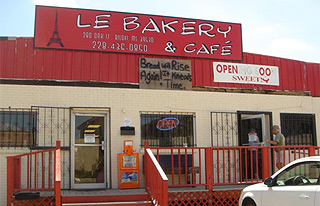The story I want to tell you is hopelessly inadequate, because the story of East Biloxi cannot be contained in a sandwich shop. My inclination is to tell stories through food, but sometimes I have to be honest with myself and say that the food can’t tell enough of the truth of the story.
Still, for a while, after Hurricane Katrina destroyed 8 out of every 10 homes in this Mississippi community of 12,000 people, to come here meant that you would most likely eat a báhn mi from Le Bakery, a Vietnamese-run bakery and sandwich shop, the de facto commissary of the relief effort.
When I first arrived here, a full 6 months after the storm, Le Bakery was one of maybe four places you could get something to eat. The others were the hospital cafeteria, the gas station market, and, if you could find the run-down St. Andrews apartments and knock on #4 before three o’clock, Doña Lucy would pack you up a lunch, just like she did for the newly arrived Mexican day laborers working for contractors who had a nasty habit of stiffing their pay and firing them when they got hurt on the job.

Driving around, I saw scenes that could make me think that the storm happened just the day before, but the place was already looking way more normal than it had.
Thousands of volunteers worked goddamned hard to make it so, and some continue to this day. College kids on spring break, recent grads, tradespeople, people with problems back home, people without somewhere to call “back home,” kind people, secular people, religious people, caffeinated people, drunk people, angry people, beautiful people—they all came to work, some to gut houses and kill mold, some to talk to locals and make them feel like the world didn’t forget them, some to settle in and find their calling. And, like I said, they all ate these sandwiches.
Through my month and a half in this neighborhood, these people filed into Le Bakery every day, the ovens cranking hard toasting bread and warming up lemongrass pork and sausages. They would come in their mold-proof Tyvek suits, or if they were big important foundation donors, in their three-piece suits.
Sue, the owner, greeted everyone standing in front of her cardboard sign: “Katrina made us a po’ boy and a po’ girl.” Her cheer and good food served to give people a moment of normalcy in a place that seemed to lack it, a reminder that East Biloxi is not just a disaster zone, it was never just a disaster zone.
Once, while ordering my daily sandwich, I started talking to her, telling her about my work there. She smiled, as usual, and thanked me for coming down here. But then she said, “I wish you could have seen it here before the storm.”
She meant nothing untoward by it, but suddenly I felt…I don’t know, like I didn’t belong. Like I was here to take advantage of this disaster, that this terrible thing that happened to other people was an opportunity for me to do something I could be proud of.
Just then a team of volunteers came in, dusty from work. They ordered their lunches. If the story stopped here, it might be perfect. There would be this little shop, cranking out these sandwiches, feeding the noble volunteers who would go back out there and fix this neighborhood right back up. And through the drama and the struggle and the glory of coming together in common cause, there would be this little bakery in the background, fueling it all. The story would be beautiful and wrapped up neatly, which would be nice because it was a great moment, an exciting time and place to be, and Le Bakery is great shop, run by great people, and it sells great sandwiches.
But this is what I mean by inadequacy. It would be nice for the story to end there, but it can’t. Sue’s comment reminded me that those dusty, sweaty lunchtime rushes can’t tell the story of this place before the storm. They can’t tell the story of where the place is now, after all the house gutting is done, when the neighborhood has to settle in to the long, bleak, unsexy work of permanent rebuilding. A few more places for food have re- or newly-opened since, and, two years on, the throngs of volunteers have diminished to a few bands here and there. The work is still going on, in some ways better—more professionally, more far-reaching than ever—but lunchtime at Le Bakery can be pretty slow now, a couple of orders here and there, some people coming by just to pick up some loaves of bread to make their own sandwiches.

